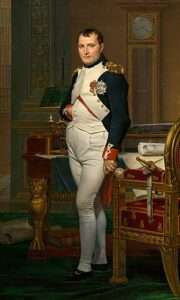|Napoleon Bonaparte a man of fascination and debate|
Napoleon Bonaparte, one of the most influential figures in European history, embarked on an extraordinary journey from his humble beginnings to becoming the Emperor of the French. His legacy, love life, and his relationship with Josephine de Beauharnais are fascinating aspects of his life. Napoleon’s life has inspired countless books, movies, and other forms of popular culture. From literature to film, his story continues to captivate and intrigue audiences worldwide.

Napoleon’s Legacy and Influence
Impact on France and Europe
- Legal Reforms: One of Napoleon’s most enduring legacies is the Napoleonic Code (Code Civil), established in 1804. It streamlined French law and became a model for legal systems worldwide, emphasizing civil liberties, property rights, and secular authority.
- Educational Reforms: Napoleon reformed the French educational system, creating lycées (secondary schools) to standardize education and prepare students for military and administrative careers.
- Administrative Reforms: He reorganized the French administrative system, establishing efficient tax collection methods and creating the Bank of France to stabilize the economy.
- Military Innovations: Napoleon revolutionized military organization and tactics, emphasizing speed, flexibility, and decisive battles. His methods influenced military strategy well into the 19th and 20th centuries.
Napoleon Political Influence and Reforms
Constitutional Changes: Napoleon’s reforms transformed the French government, laying the foundation for modern state structures in Europe. He centralized authority but also promoted meritocracy, reducing the power of the old aristocracy.
Spread of Nationalism: Napoleon’s conquests spread the ideas of the French Revolution across Europe, fostering nationalist movements and influencing the unification processes in Germany and Italy later in the 19th century.
Napoleon’s Amazing Journey
- 1789-91 Revolution of 1789 constituent assembly
- 1791-92 Constitutional monarchy – First Republic
- 1793-94 The Terror
- 1795-99 The Directory
- 1799-1804 The consulate
- 1799 Napoleon takes power
- 1804 First Empire with Napoleon Bonaparte
- 1814-30 The restoration with Louis XVIII and Charles X
Napoleon was born on August 15, 1769, in Corsica, a French territory at the time. He received a military education and quickly rose through the ranks during the turbulent years of the French Revolution. His military prowess and political acumen led him to seize power in a coup in 1799 Paris, effectively ending the French Revolution and establishing the Consulate, with him as First Consul.
His military campaigns, known as the Napoleonic Wars, extended French influence across much of Europe. He crowned himself Emperor of the French in 1804, marking the height of his power. The coronation ceremony at Notre-Dame in Paris was a grand affair, with Josephine playing a significant role. She was crowned Empress of the French alongside her husband.
His journey was marked by both military conquests and political reforms, which included the Napoleonic Code, a legal system that greatly influenced modern European law.
Napoleon’s military campaigns were legendary. He expanded the French Empire through a series of conquests, including the Italian and Egyptian campaigns, the Battle of Austerlitz, and the Peninsular War. His tactical brilliance and audacity on the battlefield made him a formidable foe. Napoleon’s most famous battles include the Battle of Austerlitz (Germanic Empire), the Battle of Borodino (Russia), and the Battle of Waterloo (Belgium).
In addition to its strategic importance, the battle of Austerlitz, the campaign which preceded it, leading the Grande Armée from Boulogne-sur-Mer (Pas-de-Calais) to Austerlitz, and the ruses of Napoleon, are considered a masterpiece tactical work of Napoleon I, taught in all military academies in the world.
Timeline of Napoleon Bonaparte’s Life
Napoleon Early Life
August 15, 1769: Napoleon Bonaparte is born on the island of Corsica.
1779: Attends military school at Brienne-le-Château in France.
1784: Enters the prestigious École Militaire in Paris.
1785: Graduates from École Militaire and is commissioned as a second lieutenant in the artillery.
Rise to Power
1793: Gains prominence during the Siege of Toulon, helping to recapture the city from royalists and their British allies. Promoted to brigadier general.
1795: Suppresses the royalist insurrection against the revolutionary government in Paris, known as the 13 Vendémiaire, gaining further political influence.
1796-1797: Leads successful military campaigns in Italy against the Austrians, establishing himself as a brilliant military commander.
1798: Launches the Egyptian Campaign, aiming to undermine British access to India. The campaign has mixed results but includes the discovery of the Rosetta Stone.
Consulate Period
1799: Returns to France from Egypt. On November 9 (18 Brumaire), overthrows the Directory in a coup d’état and establishes the Consulate, becoming First Consul.
1800: Wins the Battle of Marengo, solidifying his power.
1802: Signs the Treaty of Amiens, temporarily ending hostilities with Britain. Becomes Consul for Life after a plebiscite.
Napoleon Emperor of the French
1804: Proclaims himself Emperor of the French, crowned Napoleon I on December 2.
1805: Defeats the Austrian and Russian armies at the Battle of Austerlitz.
1806: Establishes the Continental System, aiming to blockade Britain economically.
1807: Signs the Treaties of Tilsit with Russia and Prussia after victories at Friedland and other battles.
1808: Invades Spain, initiating the Peninsular War.
Height of Power
1810: Marries Marie Louise, Archduchess of Austria, after divorcing his first wife, Josephine de Beauharnais.
1812: Invades Russia; despite initial successes, the campaign ends in disaster with a devastating retreat from Moscow.
Napoleon Decline and Fall
1813: Defeated at the Battle of Leipzig (Battle of Nations).
1814: Allied forces invade France; Napoleon abdicates on April 6 and is exiled to the island of Elba.
1815: Escapes from Elba and returns to France for the Hundred Days. Defeated at the Battle of Waterloo on June 18. Abdicates again and is exiled to Saint Helena.
Exile and Death
1815-1821: Lives in exile on the island of Saint Helena in the South Atlantic Ocean.
May 5, 1821: Dies on Saint Helena.
Posthumous
1840: Napoleon’s remains are returned to France and interred at Les Invalides in Paris.
Napoleon’s Legacy around the world
Napoleon’s legacy is complex. He is often remembered for his military genius, the spread of the principles of the French Revolution, and his administrative reforms. The Napoleonic Code, which emphasized equality before the law, property rights, and religious tolerance, left a lasting impact on many legal systems around the world.
The Consulate regime having finally brought a certain political stability from 1799-1800, the context was conducive to the effective shaping of the codification of civil law:
- Bonaparte possessed the will of a head of state, a desire for political unification and the power of the State which implies the unification of law;
- The Revolution “contributed” to the renewal of ideas;
- The need to realize the reign of the Law seemed imperative;
- Basically, after ten years of Revolution, the French aspired to social peace and stability;
- Bonaparte also wanted to guarantee a minimum of civil liberties to the citizen.
Napoleon’s attempt to economically isolate Great Britain by implementing the Continental System had wide-ranging consequences. While it aimed to weaken Britain, it strained relations with other European powers and contributed to his eventual downfall.
Napoleon’s influence on the world is still felt today. His military strategies, the Napoleonic Code, and the spread of the French Revolution’s ideals have left a lasting legacy on Europe and beyond.
Napoleon and his fall
However, his aggressive expansionist policies and his attempt to establish a European empire led to widespread warfare and immense suffering. Following a series of defeats, Napoleon was exiled to the island of Elba in 1814, seemingly marking the end of his rule. However, his story was far from over. In 1815, Napoleon made a daring return to France, known as the Hundred Days. He briefly regained power, but his defeat at the Battle of Waterloo led to his second exile, this time to Saint Helena. Napoleon spent his final years in isolation on the remote island of Saint Helena. His life in exile is marked by contemplation, writing his memoirs, and suffering from illness.
The Napoleonic Wars had profound consequences, including the redrawing of European borders and the eventual defeat of Napoleon in 1815 at the Battle of Waterloo, leading to his exile to the island of Saint Helena, where he died in 1821.
Napoleon and Josephine
Napoleon’s personal life was also a subject of interest. He married Josephine de Beauharnais in 1796, and their relationship was passionate and tumultuous. Josephine had been previously married and had two children. Although Napoleon deeply loved Josephine, their marriage faced challenges, including her inability to produce an heir to his throne.
In 1809, due to political considerations and the desire for a legitimate heir, Napoleon divorced Josephine, which was a heartbreaking decision for both of them. He then married Marie Louise of Austria, with whom he had a son, Napoleon II. Josephine remained close to Napoleon until her death in 1814. Following her divorce from Napoleon, Josephine lived a quieter life but remained influential in Parisian society. Josephine’s social connections and her role as the first lady of France played a crucial role in boosting Napoleon’s public image and his political ascent.
To conclude, Napoleon’s journey from a Corsican military officer to the Emperor of the French left a profound impact on European history. His legacy is marked by both his contributions to law and governance and the consequences of his military campaigns. His love life, especially his relationship with Josephine, adds a human dimension to his larger-than-life historical figure.
Napoleon Marriage and Relationships
First Marriage: Napoleon married Joséphine de Beauharnais on March 9, 1796. Joséphine, a widow with two children, was six years his senior. The marriage was initially passionate but later strained due to her inability to bear him a son.
Second Marriage: After divorcing Joséphine in 1810, Napoleon married Marie Louise, Archduchess of Austria, on April 2, 1810. This marriage was arranged for political reasons to secure an alliance with Austria.
Children: Napoleon had one legitimate son with Marie Louise, Napoleon François Charles Joseph Bonaparte (Napoleon II), born on March 20, 1811. Known as the King of Rome, his life was short and marked by exile and separation from his father.
Romantic Affairs
Mistresses: Napoleon had several mistresses throughout his life. Among the most notable were Pauline Fourès, a French soldier’s wife whom he met during the Egyptian Campaign, and Marie Walewska, a Polish noblewoman with whom he had an illegitimate son, Alexandre Colonna-Walewski.
Ask me for a Napoleon private tour across Paris.
Emy,

